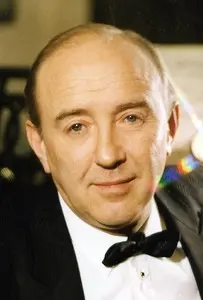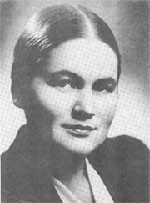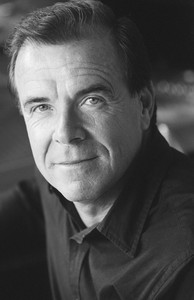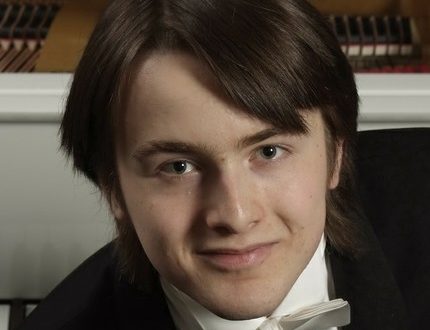
Vladimir Vsevolodovich Krainev |
Vladimir Krainev

Vladimir Krainev has a happy musical gift. Not just large, bright, etc. – although we will talk about this later. Exactly – happy. His merits as a concert performer are immediately visible, as they say, with the naked eye. Visible to both the professional and the simple music lover. He is a pianist for wide, mass audiences – this is a vocation of a special kind, which is not given to each of the touring artists …
Vladimir Vsevolodovich Krainev was born in Krasnoyarsk. His parents are doctors. They gave their son a broad and versatile education; his musical abilities were not ignored either. From the age of six, Volodya Krainev has been studying at the Kharkov Music School. His first teacher was Maria Vladimirovna Itigina. “There was not the slightest provincialism in her work,” Krainev recalls. “She worked with children, in my opinion, very well …” He began performing early. In the third or fourth grade, he publicly played a Haydn concerto with the orchestra; in 1957 he took part in a competition of students of Ukrainian music schools, where he was awarded, together with Yevgeny Mogilevsky, the first prize. Even then, as a child, he passionately fell in love with the stage. This has been preserved in him to this day: “The scene inspires me … No matter how great the excitement, I always feel joy when I go out to the ramp.”
- Piano music in the Ozon online store →
(There is a special category of artists – Krainev among them – who achieve the highest creative results precisely when they are in public. Somehow, in ancient times, the famous Russian actress M. G. Savina flatly refused to play a performance in Berlin for one the only spectator – Emperor Wilhelm. The hall had to be filled with courtiers and officers of the imperial guard; Savina needed an audience … “I need an audience,” you can hear from Krainev. )
In 1957, he met Anaida Stepanovna Sumbatyan, a well-known master of piano pedagogy, one of the leading teachers at the Moscow Central Music School. At first, their meetings are episodic. Krainev comes for consultations, Sumbatyan supports him with advice and instructions. Since 1959, he has been officially listed in her class; now he is a student of the Moscow Central Music School. “Everything here had to be started from the very beginning,” Krainev continues the story. “I won’t say that it was easy and simple. The first time I left the lessons almost with tears in my eyes. Until recently, in Kharkov, it seemed to me that I was almost a complete artist, but here … I suddenly faced completely new and great artistic tasks. I remember they even frightened at first; then began to seem more interesting and exciting. Anaida Stepanovna taught me not only, and not even so much, pianistic craft, she introduced me to the world of real, high art. A person of exceptionally bright poetic thinking, she did a lot to make me addicted to books, painting … Everything about her attracted me, but, perhaps, most of all, she worked with children and adolescents without a shadow of schoolwork, as with adults. And we, her students, really grew up quickly.”
His peers at school remember when the conversation turns to Volodya Krainev in his school years: it was liveliness, impulsiveness, impulsiveness itself. They usually talk about such people – a fidget, a fidget … His character was direct and open, he easily converged with people, under all circumstances he knew how to feel at ease and naturally; more than anything in the world he loved a joke, humor. “The main thing in Krai’s talent is his smile, some kind of extraordinary fullness of life” (Fahmi F. In the name of music // Soviet culture. 1977. December 2), one of the music critics would write many years later. This is from his school days…
There is a fashionable word “sociability” in the vocabulary of modern reviewers, which means, translated into ordinary colloquial language, the ability to easily and quickly establish a connection with the audience, to be understandable to listeners. From his very first appearances on the stage, Krainev left no doubt that he was a sociable performer. Due to the peculiarities of his nature, he generally revealed himself in communication with others without the slightest effort; approximately the same thing happened with him on stage. G. G. Neuhaus specifically drew attention to: “Volodya also has the gift of communication – he easily comes into contact with the public” (E. O. Pervy Lidsky // Sov. Music. 1963. No. 12. P. 70.). It must be assumed that Krainev owed his subsequent happy fate as a concert performer not least to this circumstance.
But, of course, first of all, he owed to her – a successful career as a touring artist – his exceptionally rich pianistic data. In this respect, he stood apart even among his Central School comrades. Like no one, he quickly learned new works. Instantly memorized the material; rapidly accumulated repertoire; in the classroom, he was distinguished by quick wit, ingenuity, natural acumen; and, which was almost the main thing for his future profession, he showed the very obvious makings of a top-class virtuoso.
“Difficulties of a technical order, I almost did not know,” says Krainev. Tells without a hint of bravado or exaggeration, just the way it was in reality. And he adds: “I succeeded, as they say, right off the bat …” He loved super-difficult pieces, super-fast tempos – a hallmark of all born virtuosos.
At the Moscow Conservatory, where Krainev entered in 1962, he studied at first with Heinrich Gustavovich Neuhaus. “I remember my first lesson. To be honest, it wasn’t very successful. I was very worried, I could not show anything worthwhile. Then, after a while, things got better. Classes with Genrikh Gustavovich began to bring more and more joyful impressions. After all, he had a unique pedagogical ability – to reveal the best qualities of each of his students.
Meetings with G. G. Neuhaus continued until his death in 1964. Krainev made his further journey within the walls of the conservatory under the guidance of his professor’s son, Stanislav Genrikhovich Neuhaus; graduated from his class last conservatory course (1967) and graduate school (1969). “As far as I can tell, Stanislav Genrikhovich and I were by nature very different musicians. Apparently, it only worked for me during my studies. The romantic “expressive” of Stanislav Genrikhovich revealed a lot to me in the field of musical expressiveness. I also learned a lot from my teacher in the art of piano sound.”
(It is interesting to note that Krainev, already a student, a graduate student, did not stop visiting his school teacher, Anaida Stepanovna Sumbatyan. An example of a successful conservatory youth that is infrequent in practice, testifying, undoubtedly, both in favor of the teacher and the student.)
Since 1963, Krainev began to climb the steps of the competitive ladder. In 1963 he received the second prize in Leeds (Great Britain). The following year – the first prize and the title of winner of the Vian da Moto competition in Lisbon. But the main test awaited him in 1970 in Moscow, at the Fourth Tchaikovsky Competition. The main thing is not only because the Tchaikovsky Competition is famous as a competition of the highest category of difficulty. Also because failure – an accidental failure, an unforeseen misfire – could immediately cross out all his previous achievements. Cancel what he had worked so hard to get at Leeds and Lisbon. This happens sometimes, Krainev knew it.
He knew, he took risks, he was worried – and he won. Together with the English pianist John Lill, he was awarded the first prize. They wrote about him: “In Krainev there is what is commonly called the will to win, the ability to overcome extreme tension with calm confidence” (Fahmi F. In the name of music.).
1970 finally decided his stage fate. Since then, he has practically never left the big stage.
Once, at one of his performances at the Moscow Conservatory, Krainev opened the evening’s program with Chopin’s polonaise in A-flat major (Op. 53). In other words, a piece that is traditionally considered one of the most difficult pianists’ repertoires. Many, probably, did not attach any importance to this fact: are there not enough Krainev, on his posters, the most difficult plays? For a specialist, however, there was a remarkable moment here; where does it start an artist’s performance (how and how he finishes it) speaks volumes. To open the clavirabend with an A-flat major Chopin polonaise, with its multi-colored, finely detailed piano texture, dizzying chains of octaves in the left hand, with all this kaleidoscope of performing difficulties, means not to feel any (or almost none) “stage fear” in oneself. Do not take into account any pre-concert doubts or spiritual reflection; to know that from the very first minutes of being on the stage, that state of “calm confidence” should come, which helped Krainev at competitions – confidence in his nerves, self-control, experience. And of course, in your fingers.
Special mention should be made of Krainev’s fingers. In this part, he attracted attention, as they say, since the days of the Central School. Recall: “… I almost did not know any technical difficulties … I did everything right off the bat.” This can only be given by nature. Krainev always loved working at the instrument, he used to study at the conservatory for eight or nine hours a day. (He didn’t have his own instrument then, he stayed in the classroom after the lessons were over and did not leave the keyboard until late at night.) And yet, he owes his most impressive achievements in piano technique to something that goes beyond mere labor – such achievements, like his, can always be distinguished from those obtained by persistent effort, tireless and painstaking work. “A musician is the most patient of people,” said the French composer Paul Dukas, “and the facts prove that if it was only about work to win some laurel branches, almost all musicians would be awarded heaps of laurels” (Ducas P. Muzyka and originality//Articles and reviews of composers of France.—L., 1972. S. 256.). Krainev’s laurels in pianism are not only his work…
In his game one can feel, for example, magnificent plasticity. It can be seen that being at the piano is the most simple, natural and pleasant state for him. G. G. Neuhaus once wrote about the “amazing virtuoso dexterity” (Neihaus G. Good and Different // Vech. Moscow. 1963. December 21) Krainev; Every word here is perfectly matched. Both the epithet “amazing” and the somewhat unusual phrase “virtuoso adroitness“. Krainev is really surprisingly dexterous in the performing process: nimble fingers, lightning-fast and precise hand movements, excellent dexterity in everything that he does at the keyboard … Watching him while playing is a pleasure. The fact that other performers, a lower class, is perceived as intense and difficult work, overcoming various kinds of obstacles, motor-technical tricks, etc., he has the very lightness, flight, ease. Such in his performance are Chopin’s A-flat major polonaise, which was mentioned above, and Schumann’s Second Sonata, and Liszt’s “Wandering Lights”, and Scriabin’s etudes, and Limoges from Mussorgsky’s “Pictures at an Exhibition”, and much more. “Make the heavy habitual, the habitual light and the light beautiful,” taught the artistic youth K. S. Stanislavsky. Krainev is one of the few pianists in the camp of today who, in relation to the technique of playing, has practically solved this problem.
And one more feature of his performing appearance – courage. Not a shadow of apprehension, not uncommon among those who go out to the ramp! Courage – to the point of daring, to stage “daring”, as one of the critics put it. (Isn’t it indicative of the headline of a review of his performance, placed in one of the Austrian newspapers: “Tiger of the keys in the arena.”) Krainev willingly takes risks, is not afraid of him in the most difficult and responsible performing situations. So he was in his youth, so he is now; hence much of his popularity with the public. Pianists of this type usually love a bright, catchy pop effect. Krainev is no exception, one can recall, for example, his brilliant interpretations of Schubert’s “Wanderer”, Ravel’s “Night Gaspard”, Liszt’s First Piano Concerto, Debussy’s “Fireworks”; all this usually causes noisy applause. An interesting psychological moment: looking more closely, it is easy to see what fascinates him, “drunk” the very process of concert music-making: the scene that means so much to him; the audience that inspires him; the element of piano motor skills, in which he “baths” with obvious pleasure … Hence the origins of special inspiration – pianistic.
He knows how to play, however, not only with virtuoso “chic” but also beautifully. Among his signature numbers, next to the virtuoso bravura, are such masterpieces of piano lyrics as Schumann’s Arabesques, Chopin’s Second Concerto, Schubert-Liszt’s Evening Serenade, some intermezzos from Brahms’ late opuses, Andante from Scriabin’s Second Sonata, Tchaikovsky’s Dumka… If necessary, he can easily charm with the sweetness of his artistic voice: he is well aware of the secrets of velvety and iridescent piano sounds, beautifully clouded shimmers on the piano; sometimes he caresses the listener with a soft and insinuating musical whisper. It is no coincidence that critics tend to praise not only his “finger grip”, but also the elegance of sound forms. Many of the pianist’s performance creations seem to be covered with an expensive “lacquer” – you admire them with approximately the same feeling with which you look at the products of famous Palekh craftsmen.
Sometimes, however, in his desire to color the game with sparkles of sound-coloring, Krainev goes a little further than he should … In such cases, a French proverb comes to mind: this is too beautiful to be true …
If you talk about the greatest Krainev’s success as an interpreter, perhaps in the first place among them is Prokofiev’s music. So, to the Eighth Sonata and the Third Concerto, he owes much to his gold medal at the Tchaikovsky competition; with great success he has been playing the Second, Sixth and Seventh Sonatas for a number of years. Recently, Krainev has done a great job of recording all five of Prokofiev’s piano concertos on records.
In principle, Prokofiev’s style is close to him. Close to the energy of the spirit, consonant with his own worldview. As a pianist, he also likes Prokofiev’s piano writing, the “steel lope” of his rhythm. In general, he loves works where you can, as they say, “shake” the listener. He himself never lets the audience get bored; appreciates this quality in composers, whose works he puts in his programs.
But most importantly, Prokofiev’s music most fully and organically reveals the features of Krainev’s creative thinking, an artist who vividly represents today in the performing arts. (This brings him closer in certain respects to Nasedkin, Petrov, and some other concert-goers.) The dynamism of Krainev as a performer, his purposefulness, which can be felt even in the manner in which the musical material is presented, bear a clear imprint of the time. It is no coincidence that, as an interpreter, it is easiest for him to reveal himself in the music of the XNUMXth century. There is no need to creatively “reshape” oneself, to essentially restructure oneself (internally, psychologically…), as one sometimes has to do in the poetics of romantic composers.
In addition to Prokofiev, Krainev often and successfully plays Shostakovich (both piano concertos, Second Sonata, preludes and fugues), Shchedrin (First Concerto, preludes and fugues), Schnittke (Improvisation and Fugue, Concerto for Piano and String Orchestra – by the way , to him, Krainev, and dedicated), Khachaturian (Rhapsody Concerto), Khrennikov (Third Concerto), Eshpay (Second Concerto). In his programs one can also see Hindemith (Theme and four variations for piano and orchestra), Bartók (Second Concerto, pieces for piano) and many other artists of our century.
Criticism, Soviet and foreign, as a rule, is favorable towards Krainev. His fundamentally important speeches do not go unnoticed; reviewers do not spare loud words, pointing to his achievements, stating his merits as a concert player. At the same time, claims are sometimes made. Including people who undoubtedly sympathize with the pianist. For the most part, he is reproached for excessively fast, sometimes feverishly inflated pace. We can recall, for example, Chopin’s C-sharp minor (Op. 10) etude performed by him, the B-minor scherzo by the same author, the finale of Brahms’ sonata in F-minor, Ravel’s Scarbo, individual numbers from Mussorgsky’s Pictures at an Exhibition . Playing this music in concerts, sometimes almost “rather soon”, Krainev happens to run in a hurry past individual details, expressive particulars. He knows all this, understands, and yet … “If I “drive”, as they say, then, believe me, without any intent,” he shares his thoughts on this matter. “Apparently, I feel the music so internally, I imagine the image.”
Of course, Krainev’s “exaggerations of speed” are absolutely not intentional. It would be wrong to see here empty bravado, virtuosity, pop panache. Obviously, in the movement in which Krainev’s music pulsates, the peculiarities of his temperament, the “reactivity” of his artistic nature, affect. In his pace, in a sense, his character.
One more thing. At one time he had a tendency to get excited during the game. Somewhere to succumb to the excitement when entering the stage; from the side, from the hall, it was easy to notice. That is why not every listener, especially the demanding one, was satisfied in his transmission by psychologically capacious, spiritually profound artistic concepts; the pianist’s interpretations of the E-flat major Op. 81st Beethoven Sonata, Bach Concerto in F Minor. He did not fully convince in some tragic canvases. Sometimes one could hear that in such opuses he copes more successfully with the instrument he plays than with the music he plays. interprets…
However, Krainev has long been striving to overcome in himself those states of stage exaltation, excitement, when temperament and emotions are clearly overflowing. Let him not always succeed in this, but to strive is already a lot. Everything in life is ultimately determined by the “reflex of the goal,” once wrote P. I. Pavlov (Pavlov I. P. Twenty years of objective study of the higher nervous activity (behavior) of animals. – L., 1932. P. 270 // Kogan G. At the gates of mastery, ed. 4. – M., 1977. P. 25.). In the life of an artist, especially. I remember that in the early eighties, Krainev played with Dm. Kitayenko Beethoven’s Third Concerto. It was in many respects a remarkable performance: outwardly unobtrusive, “muted”, restrained in movement. Perhaps more restrained than usual. Not quite usual for an artist, it unexpectedly highlighted him from a new and interesting side … The same emphasized modesty of the playful manner, dullness of colors, rejection of everything purely external manifested itself at the joint concerts of Krainev with E. Nesterenko, quite frequent in the eighties (programs from works by Mussorgsky, Rachmaninov and other composers). And it’s not just that the pianist performed here in the ensemble. It is worth noting that creative contacts with Nesterenko – an artist invariably balanced, harmonious, superbly in control of himself – generally gave Krainev a lot. He spoke about this more than once, and his game itself – too …
Krainev today is one of the central places in Soviet pianism. His new programs do not cease to attract the attention of the general public; the artist can often be heard on the radio, seen on the TV screen; do not skimp on reports about him and the periodical press. Not so long ago, in May 1988, he completed work on the cycle “All Mozart Piano Concertos”. It lasted more than two years and was performed jointly with the Chamber Orchestra of the Lithuanian SSR under the direction of S. Sondeckis. Mozart’s programs have become an important stage in Krainev’s stage biography, having absorbed a lot of work, hopes, all sorts of troubles and – most importantly! – excitement and anxiety. And not only because to hold a grandiose series of 27 concertos for piano and orchestra is not an easy task in itself (in our country, only E. Virsaladze was the predecessor of Krainev in this respect, in the West – D. Barenboim and, perhaps, even more several pianists). “Today I realize more and more clearly that I have no right to disappoint the audience that comes to my performances, expecting something new, interesting, previously unknown to them from our meetings. I have no right to upset those who have known me for a long time and well, and therefore will notice in my performance both successful and unsuccessful, both achievements and lack thereof. About 15-20 years ago, to be honest, I didn’t bother myself much with such questions; Now I think about them more and more often. I remember once I saw my posters near the Great Hall of the Conservatory, and felt nothing but joyful excitement. Today, when I see the same posters, I experience feelings that are much more complex, disturbing, contradictory … “
Especially great, Krainev continues, is the burden of the performer’s responsibility in Moscow. Of course, any actively touring musician from the USSR dreams of success in the concert halls of Europe and the USA – and yet Moscow (perhaps several other large cities of the country) is the most important and “hardest” thing for him. “I remember that in 1987 I played in Vienna, in the Musik-Verein hall, 7 concerts in 8 days – 2 solo and 5 with an orchestra,” says Vladimir Vsevolodovich. “At home, perhaps, I would not have dared to do this … »
In general, he believes that it is time for him to reduce the number of public appearances. “When you have more than 25 years of continuous stage activity behind you, recovering from concerts is no longer as easy as before. As the years go by, you notice it more and more clearly. I mean now not even purely physical forces (thank God, they have not failed yet), but what is usually called spiritual forces – emotions, nervous energy, etc. It is more difficult to restore them. And yes, it takes more time. You can, of course, “leave” due to experience, technique, knowledge of your business, habits to the stage and the like. Especially if you play works that you have studied, what is called up and down, that is, works that have been performed many times before. But really, it’s not interesting. You don’t get any pleasure. And by the nature of my nature, I can’t go on stage if I’m not interested, if inside of me, as a musician, there is emptiness … “
There is another reason why Krainev has been performing less frequently in recent years. He began to teach. In fact, he used to advise young pianists from time to time; Vladimir Vsevolodovich liked this lesson, he felt that he had something to say to his students. Now he decided to “legitimize” his relationship with pedagogy and returned (in 1987) to the same conservatory that he graduated from many years ago.
… Krainev is one of those people who are always on the move, in search. With his great pianistic talent, his activity and mobility, he will most likely endow his fans with creative surprises, interesting twists in his art, and joyful surprises.
G. Tsypin, 1990





